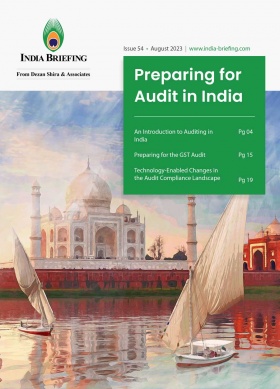North Indian State of Uttar Pradesh Releases FDI Policy, 2023: Key Provisions
Following a successful investment conclave in February and seeking to perform better on FDI metrics, the state of Uttar Pradesh (UP) recently announced its 2023 investment promotion policy targeting Fortune 500 companies. UP is competing with major industrial Indian states like Tamil Nadu, Gujarat, Karnataka, and Maharashtra to attract high-value investments from sector-leading companies, establish R&D and frontier innovation projects, and build up local manufacturing and sourcing ecosystems.
On October 31, the Uttar Pradesh Cabinet approved a new foreign direct investment policy aimed at offering incentives to international investors. The 2023 FDI policy includes exemptions in areas such as land acquisition, stamp duty, and capital investment.
Japanese company Fuji Silvertech, a leading manufacturer of precast concrete products, could be the first beneficiary under the new 2023 FDI Policy, with a planned investment of more than INR 1 billion. Fuji Silvertech has been allotted 20 acres of land in Sector-32 of the YEIDA area, at 75 percent subsidized rates, to set up manufacturing facilities. The location is near the upcoming Noida International Airport (Jewar). Another Fortune 500 company that is expected to receive subsidized land is Sify Infinite Spaces for the development of data centers in Sector-28.
Key investment goals for the state
State Parliamentary Affairs Minister Suresh Khanna said the decision to launch a new FDI policy was taken following low foreign investment coming into UP in recent years: just INR 94.35 billion (about US$1.13 billion) or 0.7 percent of FDI inflows into India between October 2019 to December 2022.
The government of Uttar Pradesh has an ambition to raise the state’s domestic gross product (GSDP) to US$1 trillion. This target entails a substantial increase in the manufacturing sector’s contribution to the domestic gross product, from approximately 25 percent to 50 percent.
Achieving this industrial transformation necessitates substantial investment from prominent foreign corporations and even foreign governments. Such investments will create vital value chains and supply chain clusters in the state, besides generating employment opportunities.
Uttar Pradesh is also working on making it easier to secure bank funds for projects to improve the private corporate investment outlook in the state. In terms of GSDP, Uttar Pradesh state is India’s second largest contributor.
Uttar Pradesh state ranks 11th out of the Indian states in attracting FDI; only 14 Fortune-500 companies are established here, as compared to 75 in Tamil Nadu, which has concerned local officials. The top five Indian states receiving FDI in 2022-23 were Maharashtra (29%), Karnataka (24%), Gujarat (17%), Delhi (13%), and Tamil Nadu (5%).
Given that the UP Global Investor’s Summit 2023 attracted investment proposals totaling around INR 35 trillion (US$420.43 billion), state officials are keen to see those deals come through.
Dedicated policy to incentivize FDI, Fortune Global 500, and Fortune India 500 companies investing in UP: Key provisions
The eligibility criteria for incentives are outlined below. Manufacturing and service units meeting the following criteria are eligible for incentives:
- Projects with FDI capital investment exceeding INR 1 billion (US$12.01 million).
- Projects with capital investment exceeding INR 1 billion by companies listed in the updated Fortune Global 500 and Fortune India 500, published until the date of application, with some exclusions, such as tobacco, alcohol, iron & steel, cement, beverages, logistics, etc. For the list of Fortune 500 companies, see the UP Government document here. Examples of these companies are Walmart, Saudi Aramco, State Grid, Amazon, Apple, Alphabet, Toyota Motor, Samsung Electronics, Hon Hai Precision Industry, Microsoft, Nestle, etc.
The key incentives offered under the Uttar Pradesh FDI Policy, 2023, include:
- Front-end land subsidy:
- Subsidized land allotment at rates of 25 percent in Paschimanchal and Madhyanchal and 20 percent in Bundelkhand and Purvanchal by Industrial Development Authorities (IDA). Subsidy of 75 percent and 80 percent, respectively, will later be reimbursed to IDAs by the state government.
- IDAs are required to allocate an area equivalent to 50 percent of gram sabha land, made available to them free of cost, to eligible projects at the acquisition cost only.
- Capital subsidy:
Provided on eligible capital investment (ECI) excluding land cost, with an annual ceiling of INR 1 billion (US$12.01 million) in seven equal annual installments at varying rates based on the region:
-
- 25 percent of the eligible capital investment in Gautam Buddha Nagar and Ghaziabad;
- 30 percent of the eligible capital investment in Paschimchal (excluding Gautam Buddha Nagar and Ghaziabad) and Madhyanchal; and
- 35 percent of the eligible capital investment in Bundelkhand and Purvanchal.
- SGST related incentives:
- Option 1: Net SGST Reimbursement at 100 percent, subject to a 10 percent annual ceiling of ECI for 10 years. The amount to be received as capital subsidy will be deducted from the eligible capital investment for calculating the maximum limit.
- Option 2: SGST refund on capital goods for companies facing an invertible tax structure within the standard investment period, subject to provisions of the UP-GST Act, 2017, with a refund provided in five equal annual installments from the date of commercial production.
- Stamp duty & registration:
- 100 percent exemption/reimbursement of stamp duty and registration fees.
- Exemption of electricity duty:
- 100 percent exemption in electricity duty for a period of 5 years.
- Skill development subsidy:
- Cost reimbursement for training a maximum of 500 persons at INR 5,000 (US$60.05) per person per month for a period of 5 years for each admissible project.
- Green industry incentives:
- One-time capital subsidy for setting up an effluent treatment plant (ETP) at the plant premises at the rate of 50 percent of the cost of setting up such facility or INR 25 million (US$300,310), whichever is lower. The subsidy will be disbursed as a lump sum upon the initiation of operations of the effluent treatment plant within the premises of the unit.
- Industrial housing:
- 10 percent of the cost of development of workers’ housing/dormitory and related collective facility or INR 100 million (US$1.20 million), whichever is lower, within a radius of 10 km. It will be provided in seven equal annual installments.
- Logistics subsidy:
- 50 percent reimbursement of transportation cost, up to a maximum of INR 20 million (US$240,249) per unit, for firms relocating existing plants to UP. This incentive amount will be provided in lump sum after commercial operations start.
- Reimbursement of patent registration fees:
-
One-time reimbursement of patent registration fees will be granted at a rate of 75 percent of the expenses, with a maximum limit of INR 1 million (US$12,012) for acquiring domestic patents and a maximum of INR 2 million for acquiring international patents, provided in a single installment.
- R&D Support Incentives:
- Option 1: Reimbursement for setting up a Standalone R&D Centre.
The government will provide a reimbursement of 25 percent of the establishment cost for a Standalone R&D Centre, capped at a maximum of INR 100 million (US$1.20 million) for eligible projects (with a minimum investment of INR 200 million / US$2.40 million). This subsidy will be disbursed in installments, with 50 percent upon project approval, the next 25 percent after three years of approval, and the remaining 25 percent upon the achievement of committed results within five years.
- Option 2: Financial grant for setting up Centers of Excellence (CoE).
Industrial units will receive a financial grant equal to 50 percent of the project cost, with a maximum limit of Rs INR 100 million (US$1.20 million) per project.
Implementation
Nodal agency
Invest UP will function as the nodal agency responsible for receiving and processing applications for both ‘Letter of Comfort (LOC)’ and ‘Disbursement’ under this policy. An evaluation committee, constituted within Invest UP in accordance with the Industrial Investment and Employment Promotion Policy-2022, will be tasked with reviewing the applications and related documents submitted through this scheme.
Following the initial evaluation, applications for LoC and Disbursement will be subjected to a review process. Recommendations will be provided by the Empowered Committee established at the level of Infrastructure & Industrial Development Commissioner (IIDC), Government of UP, as per the Rules for Industrial Investment and Employment Promotion Policy-2022. This committee, serving as the Recommending Authority, ensures that applications align with the policy’s objectives. Subsequently, the recommendations go to the Cabinet, comprising Honourable members, which functions as the ultimate Sanctioning Authority. Notably, for the disbursement of incentives, only the first and last installments require approval from the Cabinet.
FDI limits
The Consolidated FDI Policy, 2020, released by the Department for Promotion of Industry and Internal Trade has specified sectors where FDI is permitted under the automatic and government approval routes as well as investment caps, if any. In sectors or activities not explicitly listed in the FDI Policy, foreign direct investment is permissible up to 100 percent through the automatic route, contingent upon compliance with applicable laws and regulations, as well as meeting security and other specified conditions. When a minimum capitalization is stipulated, it must encompass the share premium received, in addition to the face value of the shares, only if received by the company upon the issuance of shares to the non-resident investor. Any amount paid by the transferee beyond the issue price during the transfer of shares cannot be considered in determining the minimum capitalization requirement.
Audit
If the foreign investor desires to designate a specific auditor or audit firm with an international network for the Indian investee company, the audit of such investee companies must be conducted as a joint audit. In this arrangement, one of the auditors should not belong to the same network.
(US$1=INR 83.26)
About Us
India Briefing is produced by Dezan Shira & Associates. The firm assists foreign investors throughout Asia from offices across the world, including in Delhi and Mumbai. Readers may write to india@dezshira.com for more support on doing business in India.
We also maintain offices or have alliance partners assisting foreign investors in Indonesia, Singapore, Vietnam, Philippines, Malaysia, Thailand, Italy, Germany, and the United States, in addition to practices in Bangladesh and Russia.








